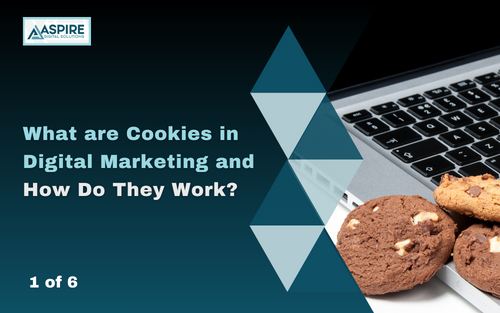Cookies play a vital role behind the scenes in our digital experiences, yet they tend to be shrouded in mystery for those outside technology fields.
And for digital marketers, understanding cookies is particularly crucial.
These small data files enable marketers to track customer online behaviors, serve targeted advertisements, provide personalized website experiences, and measure campaign success — all helping optimize your marketing campaigns.
But increased data privacy regulations combined with consumer wariness around how their data is collected and used online has put pressure on the unchecked use of cookies in marketing.
As the industry adapts to better balance utility and privacy when leveraging user data, it’s the perfect moment to understand how cookies work. That way, you can evolve with users and continue to optimize your marketing.
Let’s get started.
What Are Cookies?
Cookies are small text files consisting of letters and numbers that are downloaded and stored on your computer or mobile device when you visit a website. Websites place these cookie files onto your device to identify your browser or application as a unique user.
Essentially, they act as a name tag that enables websites to recognize you and remember key information that will make your browsing experience more useful.
For example, cookies remember data like login credentials so you don’t have to reenter them each visit. They also store preferences like location, font size, or items added to your cart to personalize and streamline repeated visits.
Cookies set by the website domain you are actually visiting are called first-party cookies. For instance, when shopping on Amazon, the Amazon.com domain places first-party cookies on your device.
There are also third-party cookies, which are set by separate companies like analytics providers or advertising networks that have code running on the site you’re visiting.
Now that you know the basic definition, let’s look closer at precisely how cookies work behind the scenes…
How Do Cookies in Digital Marketing Work?

Imagine cookies as special lanyards with QR codes given out by website receptionists. When you first check into amazon.com, the front desk clerks (servers) tag a personalized Amazon lanyard around your neck. This lanyard has a unique code that identifies you specifically.
From then on, whenever you revisit Amazon, the clerks scan your lanyard barcode and connect it to your customer profile. This allows them to restore your previous session details without you having to restart everything from scratch — just like a lanyard gets you the ability to “skip the line” at a networking event.
This behind-the-scenes process happens thanks to your web browser, which manages all the cookies assigned to you. Browsers catalog and organize the cookies, storing your unique ID codes.
They also share your code when you return to sites you already have a “lanyard from”, or cookies.
When used properly, these coded cookies offer convenience by remembering key visitor information. But in the wrong hands, they could enable customer tracking without permission.
That’s why modern browsers now limit who can distribute lanyards to users.
The Role of Cookies in Digital Marketing: Benefits vs. Growing Privacy Concerns

For digital marketers, cookies unlock critical insights and capabilities for understanding customers, personalizing messaging, and evaluating campaign effectiveness. However, they also present growing ethical concerns around data usage and privacy.
First-Party Marketing Cookies
First-party marketing cookies come from a brand’s owned domain and provide indispensable data about customer interests, needs, and behaviors. Site analytics and A/B testing tools use these first-party data trackers to help brands optimize pages and experiences.
They also enable essential functions like shopping carts, account logins, and customized homepage feeds. Without any cookies, repetitive identifying and tedious preference re-entries would be required.
From a marketing perspective, first-party cookies present fewer ethical issues since customers actively provide data in exchange for a more useful, seamless site experience. Transparency around collection and security also mitigates privacy criticisms.
Third-Party Marketing Cookies
Many brands also incorporate third-party tracking cookies onsite mainly for advertising. These cookies are deployed via ad networks such as Facebook and follow site visitors later across the internet to serve relevant display ads — commonly known as retargeting.
And retargeting via cookies allows brands to personalize their ads to specific sets of customers. So if a customer clicked on an ad and added the product to their cart but didn’t check out, you could launch an ad campaign targeting this small minority of visitors.
But enabling unknown third parties to identify and monitor customers across sites they have not directly interacted with is ethically questionable without explicit consent. That’s why Google has decided to restrict third-party cookie access on Chrome, affecting every user by Q3 2024.
Even when detailed in privacy policies, most consumers remain unaware data exchanges with external platforms are occurring behind the scenes simply by visiting a webpage.
Additionally, accuracy concerns emerge when outdated behavioral assumptions are made. While third-party cookies are extremely effective at doing their job, they’re not foolproof. For example, with retargeting ads, it’s just a matter of probability that the customer hasn’t purchased a similar product from another source.
Privacy laws have also accelerated third-party cookie restrictions, decreasing reliance viability. For instance, the European Union’s new privacy law called the General Privacy Regulation (GDPR) puts strict rules around using customer data. This regulation restricts cookie usage to only necessary functions.
Additionally, Apple’s Intelligent Tracking Prevention (ITP) feature and upcoming Privacy Sandbox seek to limit third-party cookie tracking without explicit opt-in consent across sites.
The Next Step for Brands
As cookies continue to evolve alongside privacy expectations, it’s crucial for digital marketers to stay on top of the latest ethical data strategies. By understanding the origins and functionality of cookies as outlined here, modern marketers can lean into privacy-focused innovation opportunities while still providing personalized, seamless experiences.
If you need help navigating the changing digital landscape as third-party cookies decline, our expert marketing specialists at Aspire are here to help. Regardless of new laws and cookie concerns, our marketing strategies are evolving to better help you reach your goals.








0 Comments